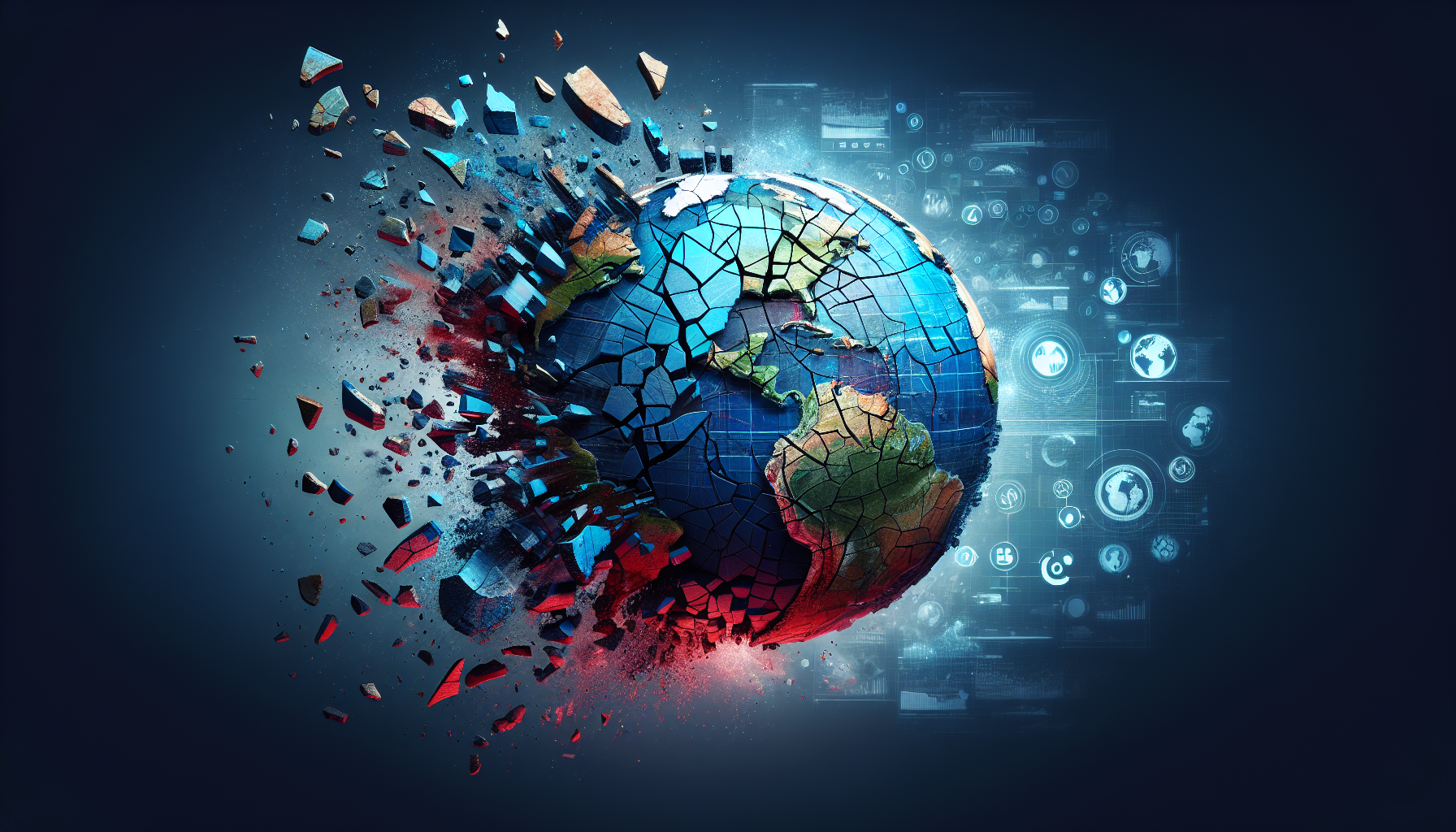
 The world of politics is witnessing a seismic shift, redefining what we know as the global political landscape. A wave of political changes is sweeping across the globe, characterized by a series of unexpected alignments and partnerships that are breaking traditional norms and sparking viral news cycles.
The world of politics is witnessing a seismic shift, redefining what we know as the global political landscape. A wave of political changes is sweeping across the globe, characterized by a series of unexpected alignments and partnerships that are breaking traditional norms and sparking viral news cycles.
Countries that were once staunch allies find themselves at odds, as emerging economic and social pressures force governments to rethink their positions. In Europe, longstanding parties are grappling with a surge of new contenders, while in Asia, powerful nations are forming unlikely coalitions aimed at consolidating regional influence. This phenomenon is not just about friendly handshakes and photo ops but signals deeper strategic shifts influencing global politics. Such realignments appear to be driven by a complex mix of economic interests, demographic changes, and the ever-evolving digital landscape that has made political information more accessible and widespread than ever before.
As observers try to make sense of these dynamics, it’s clear that conventional wisdom no longer applies. The rapid redistribution of power is mirroring the viral nature of social media trends, where platforms become arenas for shaping public opinion and rallying movements. This unusual political theater makes citizens across various nations more cynical about legacy institutions and more open to unconventional political dialogues, which can sometimes lead to unexpected electoral outcomes. This is why the current political realignment holds weight; it’s an indicator of a broad shift in how governance and representation will be navigated in the years to come.
Amid these global trends, one obvious reality checks true—it’s the era of disruption. Followers, likes, and shares are not just digital validation but have morphed into tools capable of tipping the balance in the political world. For citizens and leaders alike, understanding these dynamics is key to staying ahead in the game of modern geopolitics. As social platforms continue to shape public discourse and redefine influence, the ongoing political realignments globally promise that the next news cycle could bring with it another unexpected twist.
Impact of social media on election outcomes
Social media’s role as a political game-changer cannot be overstated. In the digital age, platforms like Facebook, Twitter, and Instagram have moved beyond mere networking sites to become powerful tools influencing election outcomes. They serve as the main stage where political ideologies clash, campaign strategies unfold, and voter engagement reaches unprecedented levels.
Recent elections around the world have demonstrated that social media is not just another channel for political communication but a battleground itself. Politicians and parties are harnessing the vast reach and real-time nature of these platforms to sway public opinion, champion causes, and, at times, spread misinformation. From viral news cycles to orchestrated campaigns, social media has become the ultimate tool for political changes, often determining the trajectory of elections in both expected and unexpected ways.
Who can forget how social media influenced pivotal elections like the US 2016 presidential election or the UK’s Brexit referendum? These events showed how platforms could amplify messages, mobilize grassroots movements, and target demographics with pinpoint accuracy. In such a landscape, traditional media outlets and political experts are sometimes left scrambling to catch up with the fast-paced, ever-evolving narratives that platforms propagate.
But why does this matter? The influence of social media on elections raises questions about the integrity of democratic processes, the power of mega-tech companies, and the capacity of governments to regulate these platforms effectively. Furthermore, as algorithms become more sophisticated, there’s an ongoing debate over the personalization of political information and its impact on creating echo chambers that skew public perception and understanding.
Ultimately, the impact of social media on election outcomes is a reflection of the larger transformations within global politics. As people increasingly turn to these platforms for their news and political discourse, the question remains: How can societies harness the benefits of this connectivity while safeguarding the principles of fair and free elections? What is certain, however, is that the viral nature of online platforms ensures the next major election could hinge on a well-timed post or a trending hashtag, altering the course of history in one fell swoop.
Rise of populist movements
Populist movements have taken center stage in modern political discourse, challenging the status quo and reshaping the political landscape across the globe. Prominent figures in countries ranging from Brazil and Hungary to the United States and Italy have ridden waves of populism to significant political heights, capitalizing on discontentment with traditional elites and prevailing governance models. These movements are characterized by their appeal to the “ordinary” person, often positioning themselves against what they perceive as corrupt or indifferent political establishments.
In this climate, charismatic leaders emerge, leveraging the power of social media and direct communication to bypass traditional political gatekeepers. These leaders often employ emotive rhetoric that resonates with a populace frustrated by economic disparities, cultural shifts, and the perceived failures of globalization. The ability to communicate directly with an audience without the filter of mainstream media has enabled these populist figures to build loyal followings and ignite viral movements. This approach disrupts traditional political channels and in many instances, redefines what it means to engage in global politics, turning campaigns into spectacles and political changes into polarizing events.
Why are these movements gaining traction now? Economic uncertainties, widening social divides, and frustrations with the pace of political reforms make fertile ground for populist rhetoric. These leaders promise swift resolutions to complex problems, often encapsulating the vacuum left by slow-moving bureaucratic processes. Cultural trends toward individualism and skepticism of authority further enhance this dynamic, allowing movements to gain momentum rapidly.
Populism’s rise reflects broader viral news cycles, where sentiment can morph overnight, and a headline or tweet can spearhead a movement. With an ever-evolving digital landscape fueling these changes, it’s clear that populism isn’t just a political moment—it’s a cultural force reshaping global politics in real-time, marking a definitive shift in how influence and power are wielded worldwide. Whether this is a passing phase or a long-term restructuring remains to be seen, but its current impact is undeniable, capturing the attention of millions and redefining the future of political engagement.
Challenges to traditional governance
The ongoing challenges to traditional governance systems are reshaping the landscape of global politics, demanding adaptability and innovation from nation-states accustomed to rule-bound processes. Legacy institutions, rooted in longstanding protocols, find themselves grappling with the speed and unpredictability of political changes driven by a digital-first world, where viral news cycles can ignite public sentiment and drive policy shifts almost overnight.
One such challenge is the erosion of public trust, a trend exacerbated by the rapid proliferation of information—both accurate and misleading—on social media platforms. Governments that once relied on established media channels for communication and policy justification must now contend with an internet-savvy populace that expects transparency and engagement in real-time. This shift not only pressures governments to revise their communication strategies but also raises concerns about maintaining authority amid a fragmented media environment.
Furthermore, the rise of decentralized movements and non-state actors capable of influencing political discourse presents a formidable challenge. Political changes sparked by grassroots activism, often coordinated through digital networks, bypass traditional political pathways, making it harder for established political entities to predict and manage. The ever-broadening digital landscape allows these movements to gain momentum quickly, presenting challenges for governance structures used to predictable electoral cycles and established hierarchies.
These challenges are not solely technological. They are indicative of a broader cultural and political shift, where governance models must evolve to align with contemporary citizen expectations. As viral news continues to influence public opinion and sway political outcomes, the pressure on traditional governance systems to adapt becomes not just a matter of preference but necessity. How governments respond to this new reality will determine their relevance and efficacy in the face of rapid global change.
In this volatile environment, global politics is increasingly defined by agility and innovation. Nation-states capable of integrating modern communication strategies and engaging citizens in meaningful dialogue may find themselves better equipped to navigate these turbulent waters. As the world watches, the question remains: Can traditional systems evolve quickly enough to remain effective, or will new models of governance emerge to better reflect the demands of a rapidly changing society?
Future outlook for global politics
As the contemporary political stage continues to unravel, anticipation surrounding the trajectory of global politics is palpable. With the fervor of seismic political changes sweeping across continents, the need for adaptability and foresight is more critical than ever. Governments around the world face limited choices: evolve and thrive or risk becoming obsolete.
One of the most expected changes is the growing adaptation to technological advances. Emerging technologies, from artificial intelligence to blockchain, are progressively influencing decision-making processes. These digital innovations could offer more transparency, streamlining bureaucratic operations, and enhancing public engagement. However, their integration raises questions about privacy, security, and the potential for further polarizing societies through echo chambers and misinformation. As debates around these issues loom, the underlying challenge will be aligning ethical frameworks with the rapid pace of technological development.
Furthermore, international relations are poised to redefine themselves in this evolving era. The traditional power dynamics face disruptions as non-traditional actors, including multinational corporations and influential individuals, continue to gain ground. By exerting transnational influence, these entities challenge age-old political norms, advocating for policies that prioritize global issues such as climate change, public health, and cybersecurity. As alliances become more fluid, nations will have to adopt agile strategies to maintain relevance in a world where influence transcends borders.
Culturally, there is a distinct shift toward grassroots involvement in political discourse. Voters worldwide now demand more accountability, transparency, and action from their leaders, leveraging the tools and platforms they have. Viral news cycles and social media movements have empowered citizens to rally around causes swiftly, impacting policy decisions in record time. While this trend democratizes political participation, it also stresses the need for leaders to discern genuine public interests amidst a cacophony of voices and conflicting narratives.
The future of global politics will undeniably require balancing these complex elements: technology, innovative governance strategies, and heightened public participation. In a world of constant change, the capacity to predict trends and preemptively adapt will separate successful nations from those struggling to keep pace. For political systems and their leaders, resiliency and responsiveness will determine not only their survival but also their continued ability to inspire and guide burgeoning generations.

